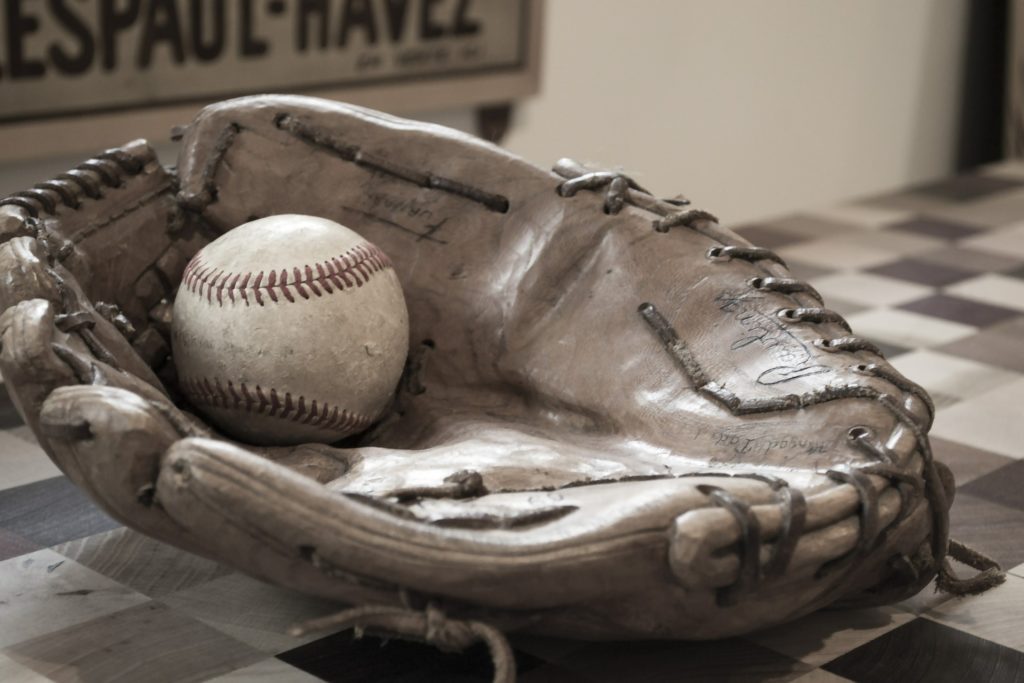- Calls to this hotline are currently being directed to Within Health, Fay or Eating Disorder Solutions
- Representatives are standing by 24/7 to help answer your questions
- All calls are confidential and HIPAA compliant
- There is no obligation or cost to call
- Eating Disorder Hope does not receive any commissions or fees dependent upon which provider you select
- Additional treatment providers are located on our directory or samhsa.gov
Setback to Comeback: Mike Marjama’s Recovery Journey & Exercise in Recovery – EDH Weekly Hope

Eating Disorder Hope provides a Facebook Live interview series called Weekly Hope with Kirsten Haglund. It airs on Wednesdays on the Eating Disorder Hope Facebook Page. Kirsten interviews guests that are experts in their field such as leading doctors, clinicians, experts, advocates, and people with their own recovery experiences, offering their insight and sharing their wisdom. Weekly Hope covers a wide array of various topics that relate to eating disorders and mental health.
Kirsten: Hello! Welcome to another episode of Weekly Hope and another meaningful conversation. We are here every week in order to bring you interviews with clinicians, experts in the field of mental health and eating disorders, non-profit leaders, advocates and individuals with their own recovery stories. We get to benefit from their insight, wisdom, and experience and give you all a chance to ask your questions and share your own stories.
I feel extremely honored and blessed to be able to host this show. We have got a lot of viewers who come back every week to watch our show, and it’s a privilege to have you guys be a part of the conversation through your comments. We get people that watch the show from all over the world, and that makes it all the more special. It is amazing to have this global community where we are supporting one another, just by listening and sharing our own stories and simply just inspiring each other.
I hope today’s show will also be an uplifting force in your life. This episode is special not just because of our guest, but also because this week is National Eating Disorders Awareness Week. This is a special week of the year, when advocates, leaders, specialists, individuals who struggle with eating disorders and their families, clinicians, experts and all of us who really care about raising awareness of this crucial issue get together and focus on a brighter future.
Many of you out there know my own recovery story, and I am a living breathing example of hope and so is our guest today. I would like to welcome Mr. Mike Marjama. Welcome, Mike!
Mike: Thank you for having me here today. It’s a pleasure!
Kirsten: So where are you joining us from today Mike?
Mike: I’m in New York City, and we have got quite a few things happening here this week which will be tremendous.
Kirsten: So, Mike, a lot of people out there in the eating disorder field have probably heard your name and know little bits of your story. You made a big decision last year to leave Major League Baseball and become an advocate for eating disorder awareness and recovery. Now you’re doing this full-time, and it’s amazing to see you have got such passion for what you do. So why don’t we just start out by hearing your story?
Mike: I want you to think about the car that you have always wanted or a house and, simply put, just any goal that you have been passionately pursuing. So, let’s say you finally get the car of your dreams and then just a few days later, you’re like “Oh did you see her car?”
We are always putting conditions on our happiness like I’ll be happy when I get this car, or I’ll be happy when I get 10,000 followers. We are always chasing something, and that’s exactly how it was for me.
I was chasing this title of being a major league baseball player, and when I did achieve it, I realized I hadn’t really solved any of my problems or resolved any of my underlying feelings.
Being in a Major League Baseball is stressful, and honestly speaking, I didn’t handle it really well. I had depression and anxiety due to high levels of stress. When you’re at that level, you can go ahead and have a great game, but if someone doesn’t like the way you received a ball as a catcher you could be let go.
 My mom is a nurse practitioner OBGYN, and she told me that she would hate it if she had thousands of people watching her give a pap smear every time. She explained to me how such extreme pressures were affecting my health.
My mom is a nurse practitioner OBGYN, and she told me that she would hate it if she had thousands of people watching her give a pap smear every time. She explained to me how such extreme pressures were affecting my health.
I have always had a passion for health and wellness. Ever since about a year ago, I got to work with LeBron James and his digital media company, Uninterrupted, and we shot a documentary.
Next thing I know, all these doors were opened up, and I was able to go on air, just about a year ago on Good Morning America.
All of a sudden, there was a massive pouring in of positive messages from people about how important it was and that I was bridging a gap for them. They said that I need to be doing this, and I need to be sharing this message.
Maybe, I wasn’t meant to be a major league baseball player my entire life. Maybe, I was destined to be able to spread this important message and be part of this positive movement going forward.
I’ve been incredibly blessed, and I have worked incredibly hard to get here. Now, it’s time to give back!
Kirsten: You are very passionate, as you mentioned earlier, about suicide prevention. You have described your battles with depression and anxiety.
One of the reasons so many of us in the eating disorder field are excited about your work is that there are very few men who are using their voice to talk publicly about their battle with an eating disorder. Can you give us a window into what your battle with an eating disorder was like from a male perspective?
Mike: I really want to start it off by saying this that as men and women, we are far more similar than we are different. We all have obstacles and numerous stresses in our lives. When I shared my story publicly, I had a lot of men and women who reached out with their stories.
Above all, I believe the message that needs to be highlighted is that eating disorders and mental health are more often a reflection of personality traits such as perfectionism, obsessiveness, and manipulation other than body image. Many times, people feel out of control, and so their body becomes the only thing that they feel they can control. For me, it really started when I was young.
I have Scandinavian roots. My brothers and sister have blond hair, blue eyes, and very fair complexion. On the other hand, I came out with dark hair, darker complexion and I was the last baby someone would’ve picked from that nursery to be Kim and Greg’s son. I didn’t fit the mold of what I thought was acceptable for my family.
I think it was around the time of junior high school and Abercrombie popularity when I started becoming conscious of my body image. I wasn’t getting the attention, and I had some underlying traumas from when I was young. So, this idea of acquiring acceptance and the lack of control led to counter-productive personality traits.
People were getting attention because of their bodies, and I wanted to accomplish that. Then the whole socially constructed image of a man being big and strong also played into this scenario.
I got into wrestling and got cut from a basketball team, and I started snowballing from that point. I started obsessively exercising and became bulimic.
The fitness industry constantly feeds our minds that it is okay to eat clean throughout the week, but when the weekend comes, it’s celebratory to have a cheat day. That one slice of pizza, however, can easily become two slices or three and then you feel guilty and start pressuring yourself to do better the following week. Ultimately, this becomes a vicious cycle.
Going forward, it is imperative to address this phenomenon in healthy ways.
Kirsten: So what was the catalyst that got you out of this cycle of abuse?
Mike: My personal experiences have taught me that it is really helpful to define the eating disorders as an abuser and realize the part of us which allows it to abuse our body. Rather than dealing with my issues, I chose my eating disorder as a numbing agent. By focusing and making my eating disorder the bad guy, I didn’t have to address anything myself.
So in my junior year of high school, my mom made this elaborate Thanksgiving dinner, and I didn’t partake in it. She had me see a personal trainer counselor. However, I ended up losing a significant amount of weight and was put into an inpatient program.
Despite working my way through this treatment, I remember thinking the entire time that I don’t have a problem and I had never heard of other men talking about any such issue.
I went through the treatment and therapy, but it wasn’t until I got back into baseball and went to junior college to play. In my first year, my coach told me that I wasn’t good enough to play. So, I was redshirted, which means I was just practicing with the team but not officially playing.
My reasoning was that if I can get into baseball, I can get all the chicks. Yet, my coach ends up handing me Viktor Frankl’s Man’s Search for Meaning, and I’m confused as to why I am receiving this book that has nothing to do with baseball.
 He said “Look! Your attitude is a decision. How you go about this is a decision. Basically, it’s going to come down to you, so you have to confront yourself.”
He said “Look! Your attitude is a decision. How you go about this is a decision. Basically, it’s going to come down to you, so you have to confront yourself.”
It hit me then that while focusing on baseball, I was diverting my attention from and pushing away the underlying personal stuff that had been causing me a lot of torment and trauma. So, I dove into that book and started realizing how blessed I truly was and what a privilege into which I had been born.
I had to look deep inside myself and realize the things that ticked me off. It was similar to sports psychology that also related to therapy.
I guess what didn’t work for me in the past was being the only boy in treatment. They would tell us how being malnourished would lead to you losing your periods, and I’m like well I didn’t have one to begin with and don’t have to worry about that.
They would talk about meditation and mantras which were foreign ideas to me because as a guy, you are told not to be mindful. Just act and meet things with aggression, or just numb down the troubles. It was hard for me to come to relate to these things in treatment, and so, I learned my treatment in a different field, which was the baseball field.
Kirsten: I’ll take the opportunity here to bring attention to the numerous people who are sharing their stories with us right now and being part of the conversation. I am also writing down the name of the book since many readers are asking about it. I’ve read Man’s Search for Meaning, and it is an incredible read.
Another tremendous book about trauma called Body Keeps the Score and divulges into how the body keeps the score of past traumatic experiences. The book focuses upon how to progress through this and sort of bridges the gap toward therapy.
Meanwhile, one of our viewers, Sonia, expresses her gratitude for you sharing your story Mike, and she loves that she is getting to hear a male’s perspective on this. Megan says that she had never thought of her eating disorder as an abuser.
The idea seems very connected to recovery and shame-releasing. Yet, Mike’s perspective makes sense that at the same time, it is important to not disconnect too much from the eating disorder to a point where you let go of all responsibility for it.
It is also important for us to understand that everyone works their recovery process in very different ways and no one way works for everyone.
Mike: We also need to highlight the issue of toxic masculinity. Men are not defined by violence, aggression or lack of emotion. In fact, there are a lot of men out there who are doing terrific things. When it comes to eating disorders, we need to be tolerant of our own de-stresses.
That is why medication can often help us at the time. Sometimes we get so worked up that we lose touch with our underlying trauma or things that are going on inside of us and medication can help us with that.
Now, medication isn’t the end-all-be-all solution, but we need to realize the things that are hurting us. We also need to feel that in others too. Like I said before, I don’t know what it is like to be a woman, but I can definitely empathize, understand and respect the struggles that come with being a woman.
We all have problems, and that’s okay. We need to talk about this in terms of mutual respect rather than putting someone down.
Kirsten: Regarding body positivity, it is a wonderful thing to strive for, and body image is a part of the conversation related to eating disorders. It’s not everything, and perhaps it’s one of the things that has been a barrier for men to get the care that they need because when eating disorders are so associated with weight loss, the drive to be thin, and sexually attractive, then it does very much seem to be a woman’s disease.
This is why we make use of tools such as the Eating Disorders Awareness Week to make sure that people know that it is not just about girls wanting to look like models or boys wanting to look like Abercrombie posters. There are deeper underlying emotional issues associated with trauma that manifest themselves, and it is another reason why so many people who struggle with eating disorders go on to battle co-occurring issues such as substance abuse, depression, self-harm, and even suicide.
What were the underlying issues for you that you discovered during your recovery?
Mike: There were crucial underlying traits such as perfectionism, the drive to be number one, and just obsessing over the process. This wasn’t just about my eating disorder though.
I’ll use the example of whenever I would go out to dinner with my mom. My mom and I share a great relationship, but we are both cut from the same cloth, and there are instances where I’m a mess, and we butt heads.
So, I am very obsessive about things where I want to control everything. My fork and knife have to be perfectly aligned with my plate.
 My mom would distract me by having me call the server, and when I would turn back, she would slightly move my knife or my fork, and I would be forced to straighten it out. She would repeatedly move my cutlery, and I would repeatedly straighten it back.
My mom would distract me by having me call the server, and when I would turn back, she would slightly move my knife or my fork, and I would be forced to straighten it out. She would repeatedly move my cutlery, and I would repeatedly straighten it back.
So, often at times, the obsessive and controlling natures of individuals play an underlying role. I’ve had to learn how to take a deep breath, realize the importance of straightening the knife and deal with that. And of course, there are traumatic episodes from your life that can continue to haunt you.
I remember being pity-dated, or certain events from my childhood, or being sexually abused when I was younger. I was verbally bullied by kids at school, and these all constituted as traumatic experiences that I never really resolved and ended up internalizing them instead.
I blamed myself incessantly and made myself believe that I was the one at fault. I have had to work through all these issues and associated emotions. I have had to forgive the people who abused me, and most importantly, I have had to forgive myself for pushing myself down a dark road.
Kirsten: You talked about self-worth, and that has always been a huge struggle for me. I did not feel a sense of self-worth, and only my eating disorder would seemingly give me that self-worth. Eventually, however, I discovered that it was a liar, and it falsely kept promising me this self-worth that it never really granted me. All I felt was hatred for myself and shame.
So, where can a genuine sense of self-worth come from?
Mike: Now, it comes from my daily gratitude list. Initially, I felt it was something I was never going to do, and even when I tried it, there was nothing I could come up with that I was grateful for, despite being so privileged my entire life. Now I can fill up pages of it, and that’s where my self-worth comes in.
I look at my self-respect and confidence as tangible things now. I have all these layers of what I am grateful for whether it be my family, my goals, my ability to impact so many people. This is where I find my confidence and my self-worth. Now I know that it has been earned by what I’ve given.
Now I always ask people if their confidence is earned because it’s not something that you just wake up with one day. That is not how it works. I am confident because I had to work through my issues and the grime. I had to struggle, and I am still here.
The point that I’m at today in life, that’s where I gained my confidence. I’ve earned it by completing my treatment, my doing therapy. Hence, when people tell me they are not happy or confident, I tell them to go earn it, and the best way to do that is to give back.
Just like every Christmas morning, you wait with anticipation for someone to open a gift that you got them and then when they open it and love it, and their face just lights up. It’s like that.
Then this warm feeling rushes over you, and you feel so freaking good. So, why not do this every day? Why don’t we give something every day? Because when you give, you get so much in return. Find your self-worth in giving and then watch how it comes back to you.
Kirsten: That’s wonderful Mike! We have got a great question from one of our viewers here. She says ‘Mike, have you ever come across someone who didn’t believe you had an eating disorder, which you could just snap out of it. If yes, how did you process this and respond to them?
Mike: Yes definitely! I’ve had people who believed I did not have an eating disorder until they saw my treatment team all at center court of a Sacramento Kings game talking about my treatment. It is important to understand here that food or your body is not the underlying problem here.
 It is more or less your way of coping with an underlying issue. For me to respond to them is not something you just snap out of. Unfortunately, what you and I are trying to do here is educate such people that this is not something you just snap out of, and I think this is where the American culture has come, specifically, we expect a quick fix for everything.
It is more or less your way of coping with an underlying issue. For me to respond to them is not something you just snap out of. Unfortunately, what you and I are trying to do here is educate such people that this is not something you just snap out of, and I think this is where the American culture has come, specifically, we expect a quick fix for everything.
With mental health specifically, it takes a multi-faceted approach and unrelenting determination to recover. So whenever someone suggested that “I snap out of it,” I just politely tell them that these are the steps I had to go through and what it took for me to get here.
It’s mostly people who haven’t had a chance to go to therapy, and I always tell people that if you went to a therapist, and it didn’t click, don’t just give up on therapy altogether. It’s a lot like dating where the first person you meet may not be your soul mate. Give another therapist a chance and work it out till you find your fit and benefit from this essential part of recovery.
Kirsten: As an elite athlete, you have had experiences with coaches and trainers and people from the sports world. What advice would you give to parents who are dealing with their sons’ or daughters’ coach or trainer and trying to have some of those difficult conversations about healthy body image regarding eating disorder in an elite world? What advice would you give parents regarding how to talk about these issues with coaches or trainers?
Mike: I am experiencing this issue still this day. I have a little sister who plays volleyball in college, and her coach calls her fat a lot. Part of the reason I am doing a lot of what I’m doing is to help enlighten the athletic community, in particular.
As athletes, we are expected to be peak performers at all times. We are expected to push our physical limits and go above and beyond. Pain is considered weakness leaving the body, or if it doesn’t hurt, it doesn’t get you better.
It wasn’t until very recently that I realized that whenever I was talking to myself, I was doing so just like a coach or trainer. That had, unfortunately, become my own voice.
I often tell people that I went to major league stadium fans yelling at me didn’t bother me because I had already told myself worse things than anybody was ever going to tell me. I was my worst critic.
I think a lot of people can relate to that and my message to all of them is that when you are talking to yourself like a coach, do so like the ones who built you up and not the ones who tore you down. Eric Barker’s Barking up the Wrong Tree discusses a very important study exploring what was common in the thread of U.S. Navy SEALs who passed the buds training.
Out of all the things, it was optimism and positive self-talk that stood out in all the successful Navy SEALs. So, my message to all the uber-masculine guys out there is that mindfulness and talking to yourself kindly is not a weakness but your strength.
Enlighten yourself and encourage yourself that way and that’s what we are trying to communicate to coaches and trainers as well that the best way to increase performance is through a positive and optimistic approach. Build that not just in yourselves but in your players as well.
Kirsten: Yes, this is definitely so important. You’re right! We have a lot of parents too who watch this show and share about the struggles their children are going through. What advice would you give to parents on how best to support their sons and daughters going through difficult times?
Mike: I believe one of the great things to do is to have different avenues of approaching this problem. My documentary with uninterrupted tends to be a great bridge because it doesn’t specifically confront a person with an eating disorder but encourages them to get the help they need. It’s human nature that when you are confronted with your issues or underlying problems, your defenses automatically go up, you shut off and just push away.
As parents, even though you have the best intentions, you can lead the horse to the water, but you cannot force it to drink the water. I am not a parent so I can’t really relate much to this, but I do speak from my parents’ experiences with me. It is important to try and find a way to circumnavigate where the idea of treatment is not so threatening and maybe communicate in a way which is relatable for your children.
 This is why advocates and motivational speakers speak of their own experiences so that the people are given an example or story that they can relate to a character may be like me. If your child is under 18, and nothing really seems to be working, then you need to get them to treatment.
This is why advocates and motivational speakers speak of their own experiences so that the people are given an example or story that they can relate to a character may be like me. If your child is under 18, and nothing really seems to be working, then you need to get them to treatment.
This is what happened in my case as well where once I was hospitalized around the age of 16 or 17, my parents forced me to go to treatment. Now did I like it? No. But did it end up saving my life? Absolutely!
Other than that, throughout any age I guess the best thing you can do for your children is to just be there for them in these struggling time, continually offering your support, presence, and encouragement. There will come that one day when they will be sick and tired of being sick and tired like I was and will reach out to for help.
Eating Disorder Hope provides a Facebook Live interview series called Weekly Hope with Kirsten Haglund. It airs on Wednesdays on the Eating Disorder Hope Facebook Page. Kirsten interviews guests that are experts in their field such as leading doctors, clinicians, experts, advocates, and people with their own recovery experiences, offering their insight and sharing their wisdom. Weekly Hope covers a wide array of various topics that relate to eating disorders and mental health.
Kirsten: These were some really wise words and thank you so much for sharing. I know that there are some people watching this right now and thinking of their sons and wishing that their sons could take guidance and treasure and cherish these words from Mike. For such viewers, we strongly encourage you to please share this video and spread the message.
We are going to be wrapping this up now but before we do that, Mike, I want to ask you if you could tell us something about your upcoming grand projects on which you have been working.
Mike: Well, there is definitely a lot happening. I’m always on the go and am known as an Energizer Bunny. Like I said earlier, I am currently working with the JED Foundation.
So, we are doing a JED Foundation voices piece which talks about suicide prevention and even more importantly, focuses upon mental health. Then on the occasion of Eating Disorder Awareness Week, we are filming with MTV, so I am going to continue to be a voice for everybody struggling with an eating disorder.
I am also continuing to work on my education to further my knowledge, especially in this field. Above all, I want to continue to inspire men and women, young and old, and work for the availability and accessibility of services they need.
A lot of this involves legislative actions and processes regarding insurance not covering most of the treatment, and hopefully, that will be another step in the right direction for all of us. And you know what? I want to run for president. I know I still got six years for that, but hey you heard it here first when you see me next on the card!
Kirsten: that’s awesome Mike! We have got a question from Priya, and she is asking about your documentary and what’s it called?
Mike: It’s called Marj, it’s like my nickname that everyone has always called me by. It’s available on YouTube, and you can also find it on Uninterrupted, which is LeBron James’s digital media company.
They do a lot of good work for the welfare of athletes, and their message and their brand is talking about being more than an athlete and utilizing the platform for accomplishing really good things. I highly recommend you all to watch it.
Kirsten: I definitely will! I actually just found it on YouTube and Uninterrupted, so I am posting the link in the comment section for our viewers to watch.
So, Mike, my last question to you is something that I ask all our guests on our show. For everyone out there, whether male or female, struggling with an eating disorder, they could all take away something positive and motivating from your story and wisdom. What would you like to say to them?
Mike: It’s okay. It’s absolutely okay to be struggling. We all do. We all bleed red regardless of our gender, age, race or ethnicity or sexual orientation. I don’t care who you are, but no one is immune to having obstacles and problems in their life.
I think the biggest thing we can do for each other is to tell each other that it is okay to have these problems and more importantly, you are more than your problems. It is time to choose your inner in Frozen.
Choose your Queen Else that unfreezes everything versus the Queen Else that freezes everything. She had the same power; her power never changes. Similarly, it is up to you whether you want to choose the darkness or the light.
 If you want to choose the villain and feel like you want to go down that road and freeze everything, you know what then we do that sometimes. But just keep on trying to find that inner Elsa that allows you to choose a healthy life and healthy decisions.
If you want to choose the villain and feel like you want to go down that road and freeze everything, you know what then we do that sometimes. But just keep on trying to find that inner Elsa that allows you to choose a healthy life and healthy decisions.
I always tell people to choose their inner superhero, to rediscover their inner strength because you are far stronger than you give yourself credit. If someone like me can make it, then so can you!
Kirsten: Amazing Mike! You are such an inspiration, and we are so grateful that you made the time to have this meaningful conversation with us. I realize how busy you are and how much you have on your plate, but all of us here in this field are so thankful for your voice, for your decision to choose to do this and to share your heart with others. We hope you continue this great mission because you are truly making a massive impact.
This has been my favorite episode so far as it brings forward a diverse point of view to eating disorders and offers a different perspective. I encourage you all to share this video and spread this important message.
Source:
Weekly Hope Conversation with Mike Marjama on February 28, 2019.
Please visit the Weekly Hope with Kirsten Haglund page for other presentations.
About the Author:
 Mike Marjama is a trailblazing athlete, who has used his platform to transform into a passionate advocate for health and wellness. Mike spent 10 years on an amazing journey, climbing through the minor leagues to eventually make his Major League debut in 2017. In 2018, he was recognized as one of the 30 best catchers in MLB, serving as the opening day catcher last year.
Mike Marjama is a trailblazing athlete, who has used his platform to transform into a passionate advocate for health and wellness. Mike spent 10 years on an amazing journey, climbing through the minor leagues to eventually make his Major League debut in 2017. In 2018, he was recognized as one of the 30 best catchers in MLB, serving as the opening day catcher last year.
As an athlete, he recognizes how athletes can create positive impacts by sharing their stories and advocating for their passions. Mike’s personal challenges with mental health and eating disorders, beginning early in his life have shaped his new journey as a public speaker, advocate, and activist. In 2018, he shared his challenges with a national audience through LeBron James’ digital media company, Uninterrupted, bringing awareness to how mental health and eating disorders can impact young men, athletes and beyond. Mike is the first male professional athlete to speak out about eating disorders and their impact on athletes.
Upon retiring from baseball, Mike has committed his life to helping shape the dialogue around mental health and wellness, youth sports, and inciting change to help men, women, young, and old to find the help and support they need.
Mike lives in Sacramento, CA, yet spends his time around the country speaking at events, supporting the work of nonprofits, and helping craft better legislation to improve mental health and wellness. He’s the proud uncle to his brother Jake’s three beautiful children and biggest fan of his sister Abby, UC Irvine Volleyball star and Big West Conference Freshmen of the Year.
About the Transcript Editor:
 Sana Ahmed is a journalist and social media savvy content writer with extensive research, print, and on-air interview skills. She has previously worked as staff writer for a renowned rehabilitation institute, a content writer for a marketing agency, an editor for a business magazine and been an on-air news broadcaster.
Sana Ahmed is a journalist and social media savvy content writer with extensive research, print, and on-air interview skills. She has previously worked as staff writer for a renowned rehabilitation institute, a content writer for a marketing agency, an editor for a business magazine and been an on-air news broadcaster.
Sana graduated with a Bachelors in Economics and Management from the London School of Economics and began a career of research and writing right after. Her recent work has largely been focused upon mental health and addiction recovery.
The opinions and views of our guest contributors are shared to provide a broad perspective of eating disorders. These are not necessarily the views of Eating Disorder Hope, but an effort to offer a discussion of various issues by different concerned individuals.
We at Eating Disorder Hope understand that eating disorders result from a combination of environmental and genetic factors. If you or a loved one are suffering from an eating disorder, please know that there is hope for you, and seek immediate professional help.
Published on April 11, 2019.
Reviewed & Approved on April 11, 2019, by Jacquelyn Ekern MS, LPC
Published on EatingDisorderHope.com

The EatingDisorderHope.com editorial team comprises experienced writers, editors, and medical reviewers specializing in eating disorders, treatment, and mental and behavioral health.


